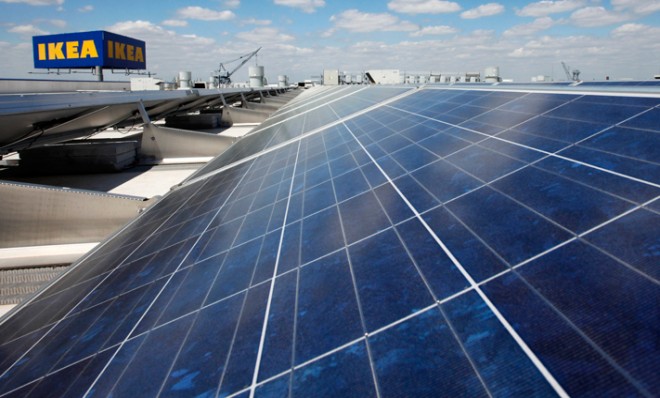The latest appliance from IKEA: Solar power panels
The flat-pack furniture company wants to take green energy mainstream

A free daily email with the biggest news stories of the day – and the best features from TheWeek.com
You are now subscribed
Your newsletter sign-up was successful
Over the next 10 months, Swedish furniture giant IKEA will begin selling solar panels at 17 stores across the U.K.
It's the first step in a plan to take solar mainstream, and IKEA sees Britain as a fertile testing ground. A combination of government subsidies and a program that allows individuals to sell excess power to the grid makes the $9,500 price tag for an 18-panel, 3.36-kilowatt system a little easier to swallow.
Combined with reduced energy costs, the deal should pay off for homeowners, according to the company. "If you are going to be in your house that long, your energy will be free after seven years," IKEA Chief Sustainability Officer Steve Howard told The Associated Press.
The Week
Escape your echo chamber. Get the facts behind the news, plus analysis from multiple perspectives.

Sign up for The Week's Free Newsletters
From our morning news briefing to a weekly Good News Newsletter, get the best of The Week delivered directly to your inbox.
From our morning news briefing to a weekly Good News Newsletter, get the best of The Week delivered directly to your inbox.
Made by China's Hanergy Holdings, the solar panels also come with an "in-store consultation and design service, installation, maintenance, and energy monitoring service," says the AP.
IKEA, meanwhile, will be able to dip its toes in a potentially enormous market. Though the company is selling the devices at low margins to keep prices down, there's a lot of opportunity in solar. "Even in markets where solar panels are popular, a relatively small sliver of the entire population uses them," says The Wall Street Journal. "This means IKEA's market potential could be large."
The high initial cost for customers does pose a challenge for IKEA, as does the "perception among some that solar panels are ugly," says the Journal. In addition, "plastering the roof with glass solar panels that resemble flat-screen television sets is more complicated and dangerous work than building flat-pack furniture."
But even so, "in the past few years the prices on solar panels have dropped, so it's a really good price now," Howard told the AP. "It's the right time to go for the consumers."
A free daily email with the biggest news stories of the day – and the best features from TheWeek.com
The initiative is also in line with the company's People & Planet Positive Sustainability Strategy, which aims to source at least 70 percent of its energy from wind and solar by 2015, and 100 percent by 2020.
At the Social Good Summit in New York last week, Howard explained how the company is making renewable energy work for its own stores. "We own and operate more than 500,000 solar panels on our stores and factories around the world," he said. "And we own and operate 17 wind farms in 7 countries. When the last wind farm's built, that will proved 51 percent of our energy with renewable energy we own."
"Renewable energy is abundant and we love the sun," he said.
Carmel Lobello is the business editor at TheWeek.com. Previously, she was an editor at DeathandTaxesMag.com.